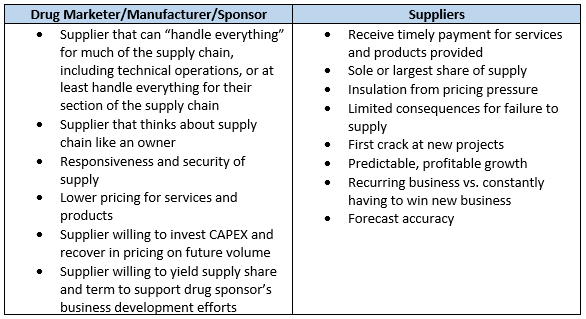They're Not Mind Readers: Have You Told Your Suppliers What You Want?
By Hal Craig, founder, Trout Creek Consulting, LLC

You’re not happy with an important supplier in your outsourced supply chain. It might be the CDMO that’s making your drug product, your drug substance supplier, or it could be the supplier of a relatively scarce chemical or a routine packaging component. There may be a myriad of reasons why you’re not happy, including schedule, pricing, a proposed scale up or validation protocol, analytical tests that were not performed, or the proposed design and estimated CAPEX of a mostly dedicated manufacturing suite for your products. Thoughts such as “Why would they do that?” or “They’re our partners, they should know this won’t work!” might cross your mind or lips. Sound familiar? Having been on both sides of the customer-supplier continuum, I’ll pose what may seem to be an obvious question: Have you clearly told your suppliers what you want, what your expectations are, and what is important to you?
There are many reasons for issues to crop up in a supply chain. Some are caused by a supplier; some by the customer; and some by geopolitical issues or natural disasters for which, even where these are somewhat foreseeable, there aren’t realistic, economical work-arounds available to every company to mitigate all consequences. In this first part of a two-part column, I’ll offer some perspectives about supply chain partners to improve understanding. Part 2 will focus on customer-driven issues — five questions that customers should know the answers to (or at least have a good first pass guess at).
Perspectives Of Supply Chain Partners
The term “partner” is used a lot in the drug industry. Sometimes it is the startup drug company looking to partner with a CDMO that can take point on all things technical and supply chain; sometimes it is the CDMO looking to be the “one stop shop” development and manufacturing partner for a drug company. Table 1 compares and contrasts, in descending order of importance based on observation, the differing perspectives on supply chain partnership between startup to small drug companies and suppliers.
Table 1: Perspectives On What Supply Chain Partners Are Looking For

The startup to small drug company is typically looking for a supply chain that can operate smoothly, inexpensively, and without a lot of human and capital investment from the drug company that has limited resources. It is looking for suppliers that will approach the supply chain like an owner and fill in the gaps that the drug company doesn’t cover or may not know about. The startup to small drug company may also be looking for suppliers that will cooperate with changes in the supply chain based on the preferences of an acquirer or licensee of the drug company’s products or technology. The supplier is looking for profitable growth; lower competitive intensity and account churn; to be paid for its services with cash, not equity; to minimize its capital risk; and, from an opportunity cost perspective, to ensure that its development assets (people, equipment, and suites) are utilized near term on projects with the best long-term value creation potential.
The drug company and the supplier are each looking for a partnership that provides benefits but is also flexible enough to allow each to pursue its own best interests. In summary, the drug company-supplier partner perspective has an inherent conflict between (a) the drug company that desires services now, when it may have limited funds, security of supply, and long-term supply chain flexibility and (b) suppliers that can provide services that need to be paid for now and that want to ensure their assets are allocated to securing projects that give the best longer-term results. Finding the right structure to manage this inherent partner conflict and, very importantly, keeping any negotiating and other partner conflicts in the background so that team members doing the critical work of bringing a drug product to market are not distracted or demotivated, is a key takeaway.
Another perspective to keep in mind is that people and organizations tend to offer solutions that have worked for them before or are acceptable to their organization’s culture. Another way to state this is "If you have a hammer, every problem looks like a nail.” If one of your suppliers is used to working with startups, it may not suggest certain approaches that are typically rejected due to cost. If your startup drug company is staffed with folks who’ve never taken a product through completion of Phase 3, they may not know what to ask when commercialization becomes a reality. An important takeaway for an executive at a startup to small drug company is to make sure that you understand the experience and perspectives of the key people on your team — both at your company and at suppliers — to ensure that the team has the capability to deliver success.
Conclusion
Your suppliers aren’t mind readers, and their perspectives and experience may lead them to make different decisions than you would. If you’re not happy with your supply chain and, assuming the unhappiness is due to items that are reasonably within the control of your supply chain partners, then find out if you’ve clearly told your suppliers what you want, what your expectations are, and what is important to you.
About the Author:
 Hal Craig is the founder of Trout Creek Consulting, LLC, a strategy and life science supply chain consultancy focused on solving CMC, outsourcing, strategy, and technical challenges. Clients include venture-backed, family owned, private equity-owned, and publicly traded companies. Craig serves on the Physical Sciences Investment Advisory Committee of Ben Franklin Technology Partners of Southeastern Pennsylvania, is an assistant scoutmaster and committee chair emeritus with a Boy Scout Troop, and has a BSChE from the University of California, Berkeley and an MBA from the University of Michigan. You can reach him at hcraig@troutcreekconsulting.com and connect with him on LinkedIn. Trout Creek Consulting has been a member of Life Sciences Pennsylvania for over 10 years.
Hal Craig is the founder of Trout Creek Consulting, LLC, a strategy and life science supply chain consultancy focused on solving CMC, outsourcing, strategy, and technical challenges. Clients include venture-backed, family owned, private equity-owned, and publicly traded companies. Craig serves on the Physical Sciences Investment Advisory Committee of Ben Franklin Technology Partners of Southeastern Pennsylvania, is an assistant scoutmaster and committee chair emeritus with a Boy Scout Troop, and has a BSChE from the University of California, Berkeley and an MBA from the University of Michigan. You can reach him at hcraig@troutcreekconsulting.com and connect with him on LinkedIn. Trout Creek Consulting has been a member of Life Sciences Pennsylvania for over 10 years.
